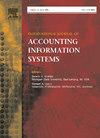Divergence from Benford’s law fails to measure financial statement accuracy
IF 6
3区 管理学
Q2 BUSINESS
International Journal of Accounting Information Systems
Pub Date : 2025-05-05
DOI:10.1016/j.accinf.2025.100745
引用次数: 0
Abstract
The Financial Statement Divergence (FSD) score, a metric of the deviation of figures from Benford’s Distribution, has become increasingly popular in assessing financial information quality at the firm-year level. We test the validity of this metric by analyzing (1) if error-free financial statements conform to Benford and (2) if the FSD score increases with the presence of accounting errors or manipulations. Regarding the first analysis, firm-year financial statements’ conformity to Benford is much lower than previously reported in the literature; this implies that the assumption of error-free financial statements conforming to Benford would hold only if an exceptionally high proportion of companies report financial statements with a substantial number of line items affected by errors or manipulations. Regarding the second analysis, we theoretically show that the relationship between accounting errors or manipulations and divergence from Benford is inconsistent: FSD score variations are independent of the size of the error or manipulation, and errors or manipulations may increase, decrease, or have no effect on the FSD score. Empirically, we show that various subsamples with a priori lower accounting quality do not exhibit a higher FSD score and, using simulated values, we verify that manipulations can increase, decrease, or have no effect on the FSD depending on the value of the pre-managed FSD. Taken together, our results cast doubts on the FSD score’s validity in assessing financial information quality at the firm-year level.
偏离本福德定律不能衡量财务报表的准确性
财务报表偏离度(FSD)分数是衡量数据偏离本福德分布的一种指标,在评估公司年度财务信息质量方面越来越受欢迎。我们通过分析(1)无差错财务报表是否符合Benford和(2)FSD评分是否随着会计错误或操纵的存在而增加来检验这一指标的有效性。对于第一种分析,公司年度财务报表对Benford的符合性远低于先前文献报道;这意味着,只有当非常高比例的公司报告的财务报表中有大量的行项目受到错误或操纵的影响时,符合Benford的无错误财务报表的假设才成立。关于第二种分析,我们从理论上表明会计错误或操纵与Benford分歧之间的关系是不一致的:FSD分数的变化与错误或操纵的大小无关,错误或操纵可能会增加、减少或对FSD分数没有影响。根据经验,我们表明,具有先验较低会计质量的各种子样本不会表现出较高的FSD得分,并且使用模拟值,我们验证了操作可以增加,减少或对FSD没有影响,这取决于预管理的FSD的值。综上所述,我们的结果对FSD评分在评估公司年度财务信息质量方面的有效性提出了质疑。
本文章由计算机程序翻译,如有差异,请以英文原文为准。
求助全文
约1分钟内获得全文
求助全文
来源期刊
CiteScore
9.00
自引率
6.50%
发文量
23
期刊介绍:
The International Journal of Accounting Information Systems will publish thoughtful, well developed articles that examine the rapidly evolving relationship between accounting and information technology. Articles may range from empirical to analytical, from practice-based to the development of new techniques, but must be related to problems facing the integration of accounting and information technology. The journal will address (but will not limit itself to) the following specific issues: control and auditability of information systems; management of information technology; artificial intelligence research in accounting; development issues in accounting and information systems; human factors issues related to information technology; development of theories related to information technology; methodological issues in information technology research; information systems validation; human–computer interaction research in accounting information systems. The journal welcomes and encourages articles from both practitioners and academicians.

 求助内容:
求助内容: 应助结果提醒方式:
应助结果提醒方式:


